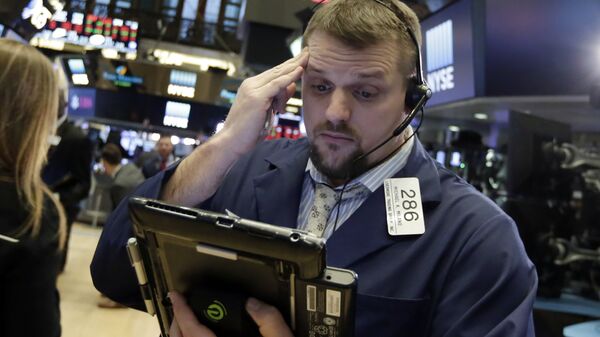Kristian Rouz — A new report finds that roughly one-third of the world's most prominent sovereign wealth funds are cutting their exposure to equity markets amidst concerns of disruptions in global trade. Money managers are concerned the impending realignment in the global supply chains could have harmful near-to-medium-term effects on some of the most popular stocks.
Asset management company Invesco released a study examining the possible effects of trade tensions between the US and Mainland China, as well as its other major trade partners. The study revealed that a significant share of wealth funds have either commenced or are planning to reduce their stock holdings over the next three years.
READ MORE: Eurozone Economy Slows Amidst Stronger Euro, Stock Market Volatility
Fund managers say stocks might underperform over that period compared to other types of investment assets, including those outside the financial sector. They cited their expectations of robust domestic growth across the advanced economies and some emerging markets, coupled with fears of the so-called "trade wars."
"Equities had a good run last year, but this hasn't caused investors to change their long-term expectations — they think returns going forward will be tough," Alex Millar of Invesco said, commenting on the report.
Stock valuations typically reflect the overall company performance, which includes quarterly earnings, operational profitability, assets at hand, as well as liabilities and exposure to risk. Whilst corporate earnings are expected to grow amid the expectations of a broader economic acceleration over the coming three years, the risk component could hold back the gains in stock values.
Invesco's report questioned 126 money managers in both the private and central bank sectors, who oversee a total of $17 trln in assets — which is commensurate with the total US GDP.
The researchers found that the funds' equity holdings have surpassed bonds this year, with the total share of stocks in their portfolios rising to 33 percent from 29 percent in 2017. This is a positive development, as investing in bonds is a preferable strategy during recessions or heightened expectations of such.
READ MORE: IMF Chief: Stock Market Turmoil Not a Major Concern
However, only 40 percent of fund managers said they are happy with the current state of affairs in the global markets and economy. 35 percent said they would reduce their stock holdings in the years to come.
Investors said geopolitical risks and the currently overvalued stock markets across the globe are adding to their concern of trade wars.
Not in China, however, where the governmental debt market is experiencing an influx of investment. This comes despite China's huge burden of corporate and provincial debt, which is ultimately guaranteed by the central government in Beijing — and investors see it as a sign of longer-term stability.
"Markets with a deep onshore investor base will be better insulated from swings in foreign portfolio flows," Jennifer Kusuma of Australia & New Zealand Banking Group Ltd. (ANZ) said.
Meanwhile, 65 percent of investors have expressed a growing interest in the private-sector lending industry. This comes despite the rising central bank interest rates around the world.
Investors believe that the ultra-low unemployment in the US, the UK, the Eurozone, and beyond will boost consumer purchasing power and demand for loans — regardless of the interest.
"Also, since the financial crisis, a lot of banks have pulled back from lending, which provided an opportunity for private credit funds to fill that gap," Invesco's Millar stressed.
However, overall volumes of foreign direct investments (FDI) worldwide are expected to face significant downward pressure until the trade-related uncertainty fades. Chinese investments in the US have fallen by a massive 92 percent amidst the Trump administration's Section 301 probe.
Some investors have suggested that the expected downturn in global mass-migration will also squeeze international money flows, as fewer migrants would send money home in the years to come.
Invesco's report also suggested that the rise in equity investment over the past year was likely temporary, as money managers sought to park their money instead of cashing out — not least due to the unpredictable fluctuations of currency FX rates — whilst looking for investment opportunities elsewhere.


